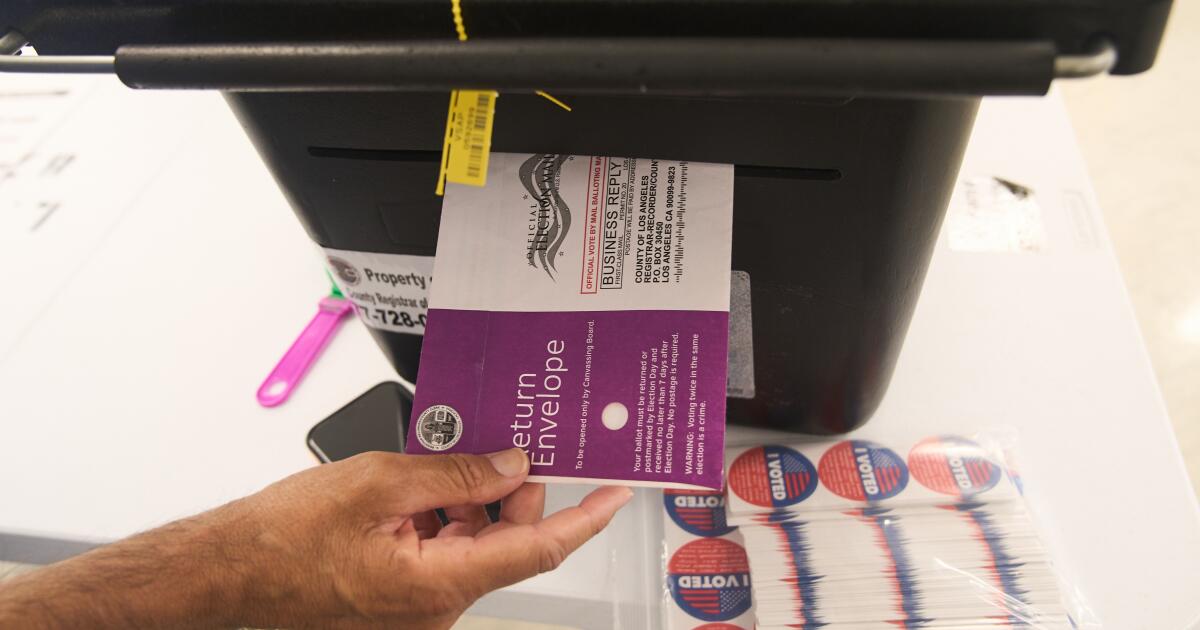Californians are casting their votes today on a pivotal measure known as Proposition 50, which aims to reshape the state’s congressional districts. This ballot initiative is part of a broader Democratic strategy to counteract President Donald Trump‘s influence and bolster their representation in Congress ahead of the 2026 elections. Proposition 50 is the only item on the special election ballot, drawing significant attention and financial support.
The proposition was introduced in response to Trump’s encouragement of Republican-led states, such as Texas, to alter their congressional maps to favor GOP candidates. This move was perceived as an attempt to maintain Republican control over the U.S. House of Representatives during the final years of his presidency. Supporters of Proposition 50 view the vote as a reflection of California’s opposition to Trump, who remains deeply unpopular in the state.
Polling indicates that supporters of the measure have outpaced their opponents in both fundraising and public opinion. According to recent surveys, Proposition 50 enjoys a lead among voters, with only 2% of likely voters remaining undecided, as reported by UC Berkeley.
Voting Dynamics and Historical Context
Polls in California are open from 07:00 to 20:00 local time, allowing any voter in line at closing time to cast their ballot. The state permits same-day voter registration, enabling residents to participate in the election even if they have not registered beforehand. Approximately 6.7 million ballots, representing 29% of California’s 23 million registered voters, had already been cast by Monday, according to data from redistricting expert Paul Mitchell.
The electoral landscape in California has seen an influx of campaign advertisements, mailers, and social media outreach in the weeks leading up to the election. Early voting has shown a significant Democratic advantage, raising concerns among Republican strategists about potential voter turnout on Election Day.
Former chief strategist for Trump, Steve Bannon, expressed apprehension about the Republican prospects in California. He noted that regions like Huntington Beach, which have a strong pro-Trump sentiment, may still witness a significant defeat concerning Proposition 50.
Congressional redistricting typically occurs every decade after the U.S. Census, with California employing an independent commission for this purpose since 2010. In response to Trump’s push for favorable maps in Republican states, California Democrats have proposed changes that could add five Democratic representatives to the state’s current 52-member delegation.
The Campaign and Its Implications
The stakes surrounding Proposition 50 have attracted substantial financial investments from both supporters and opponents, with contributions exceeding $193 million. Notable figures, including former President Barack Obama and former Governor Arnold Schwarzenegger, have featured in advertisements advocating for and against the measure, respectively. Obama has framed Proposition 50 as a necessary step to restore balance to elections, while Schwarzenegger has argued that it undermines the independent redistricting process established by voters.
Democrats assert that controlling Congress in the upcoming elections is crucial for halting Trump’s policies, particularly in light of public opposition to immigration enforcement and cuts to social programs. “Republicans want to steal enough seats in Congress to rig the next election and wield unchecked power for two more years,” Obama states in a campaign ad.
Conversely, opponents argue that Proposition 50 represents a betrayal of the electorate’s decision to create an independent redistricting commission. Schwarzenegger emphasizes the importance of protecting democracy and insists that voters should reject the measure to avoid regression.
As California voters make their decision today, the outcome of Proposition 50 remains uncertain. Even if the proposition passes, questions linger regarding whether any potential Democratic gains in congressional representation will be sufficient to counteract Republican advantages due to gerrymandering in states controlled by the GOP.
